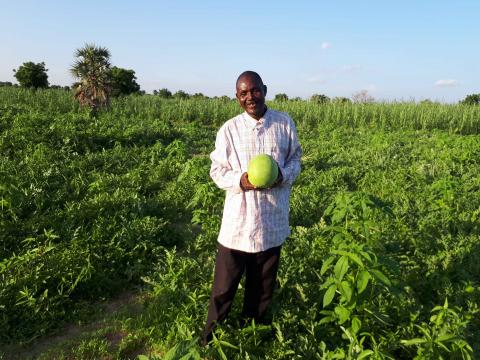How Pastor Issaka became a role model in his village thanks to Empowered Worldview

In Niger, particularly in Maradi region, agriculture occupies a dominant place in the life of populations. According to the African Journals Online, agriculture is the most important sector of Niger's economy. It represents more than 40% of the national gross domestic product and is the main source of income for more than 80% of the population. The performance of the agricultural sector is nevertheless very unstable due to its high exposure to climate change. In fact, communities experience food and nutritional insecurity every year, in particular due to poor harvests and / or insufficient income to properly access food. Thus, several farmers like Pastor Issaka Kokari live mainly from rain-fed and cereal food crops.
He narrates: ‘’My name is Issaka Kokari; I am pastor in Waraou's Church, 55 years old and married with six children. I own a ½-hectare field that I inherited from my father. For over 20 years I cultivated millet in order to feed my family. Each year I harvested about 70 sheaf of millet, which is equal to nine bags of 100 kg at a total cost of 108,000F CFA ($ 216) in the market."
"My life as a father was difficult because I could not meet the basic needs of my family. What I earned from my field was always insufficient; I had no choice but to borrow money so that I could support my family. And even though I was making money, I still had to use it to reimburse debts. Last year, my church gave me two oxen to go towards reimbursing my debt. Because of my situation, my children could not go to school regularly because they did not eat well and did not have good clothes. ’’ Issaka sadly recalls.
In 2019, 40 religious leaders like Issaka and 40 youth groups were trained in World Vision's Empowered Worldview approach across Maradi. The Bible-based programme aims to help farmers adopt new attitudes and behaviours that break dependency on aid and maximise their resources to create sustainable economic development.
With visible joy on his face, Issaka recalls his training experience. He goes ahead to share his testimony: “One day I received a World Vision training which motivated me a lot. I learned that God has provided resources all around me to be a blessing to me and that I can use all potentialities. So I thought about harnessing all the potential which is around me and I started my own field. I have chosen to cultivate watermelon rather than cultivating millet which is a risky crop because the harvest depends on the good progress of the winter season. These are cultures that we have been used to grow in our region since the time of our grandparents. So after the first rain, all the people of my village and the surrounding villages sowed millet and sorghum. Instead of sowing millet or sorghum, I sowed watermelon."
Issaka continues: "Everyone was surprised by my decision. It was the subject of speculation and criticism in the sub-region; everybody thought and said I was mad. They wondered how my family would survive. They still expected that I will come to beg for food during harvest time, so that they can blame me and say 'I told you so'. But Glory be to God! He always keeps his promises."

"At harvest time, my field produced like never before seen in the entire Maradi sub-region. I harvested 5,300 watermelons which I sold at the rate of 2500FCFA ($5) per hundred. In total, I sold 966,000 FCFA ($ 1,932) worth of watermelons; a sum of money that I have never had in my life. On top of that, I offered 1,000 watermelons to people in my village and surrounding villages. Since then, my field has been transformed like a market; everyone runs there to watch and taste my watermelons. So much so that I had to hire a guard to guard and watch the field!" adds the pastor!
A very proud Issaka concludes: "Currently, I am preparing the second session of sowing, still in the same rainy season. People of my village and those of surrounding villages are impatiently awaiting the next rainy season to carry out the same project in their fields. I thank World Vision for this training because thanks to them, I was able to exploit something other than millet. Growing watermelon allowed me to earn enough money to reimburse all my debts and live a dignified life in my village. I no longer have to walk with my head down, drowned by shame. Today I have become a respectable man and a role model throughout the sub-region. My children breathe well-being, and joy can be seen all over their faces. They have enough to eat and can go to school well.”